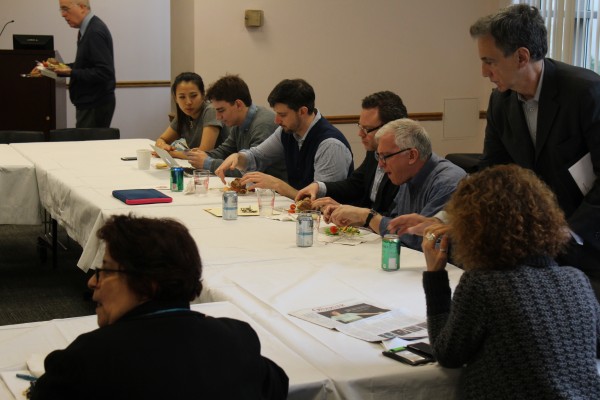Council Voices Concerns on CUSP
April 20, 2016
Early in April, Rev. Joseph McShane, S.J., president of Fordham University, released a draft of the Continuous University Strategic Planning Committee’s (CUSP) discussion document on the continuing strategy for growing and cultivating the University as a whole. The committee itself is chaired by J. Patrick Hornbeck, associate professor of theology, Debra McPhee, dean of the Graduate School of Social Service (GSS) and Peter Stace, vice president of Enrollment Services.
However, this 12-page draft document left Fordham Lincoln Center’s College Council confused on what the specifics of the plan may entail.
When the floor was opened for comments from the faculty present, many professors voiced their departmental and individual concerns. Mainly, they expressed frustration with the perceived vagueness of the CUSP document, which outlines strategic priorities for Fordham moving forward.
“It all feels very vague, and we’ve seen documents like this before that don’t seem any different,” Gwenyth Jackaway, associate chair of communication and media studies, said in response to the document. “I genuinely wonder what purpose these documents actually serve.”
Carey Kasten, associate chair of the modern languages and literature department, said, “There were a lot of mentions of research, undergraduate research and service learning, and I’m just wondering what is the support for the faculty that undertake these cases.”
Christopher Maginn, professor of history, said, “The historians spent some time on this, and we noticed there is an emphasis on performance and media, and it seems like a relegation of the humanities to a certain extent.”
Martin Di Grandi, assistant professor of chemistry, pointed to section 1B2 of the document. “There has been talk of a new science building ever since I was an undergraduate at Fordham,” Di Grandi said, who graduated from Fordham Rose Hill in 1984 and says this has been a part of planning documents with no forward motion for some time.
Section 5B2, which states that the University should strive to “substantially increase the enrollment, retention and graduation rates of students from underrepresented and underserved populations and provide sufficient financial assistance to assure they can attend and thrive at Fordham,” raised a number of concerns with the members of College Council.
This pledge to support diversity at Fordham has been a part of many other previous strategic planning documents, the wording of which has not changed in the intervening time between CUSP and the previous strategic planning documents, according to Tom De Luca, professor of political science and director of the international studies program.
“What I’d like to see is an affirmative action policy. I don’t mean just a statement about diversity or equal opportunity. The question is now, do we have an actual policy? The introduction of a diversity officer is good, but I think we need a firm policy,” De Luca continued.
It has been previously reported by The Observer that low-income students—those from families with a household income of $50,000 or less—do not receive a higher percentage of financial aid from Fordham to cover expenses. The Office of Enrollment has maintained that this is not the case.
However, there were many other parts of the draft document that individual professors did not like, including the pledges for better technology and science programs at Rose Hill.
“I think it’s fair to say that this campus is not a leading campus in technology, so we need to be aware of that going forward,” Jackaway said, reflecting the concerns of the department of communication and media studies
The members of the natural science department present at College Council were displeased with the language used in the draft document. “Not surprisingly, I’m concerned about the wording of section 2B. [It] seems to focus only on the Rose Hill campus,” Mark Botton, Ph.D., professor of biology and co-director of the environmental science program, said.
Section 2B’s stated priority is to “significantly invest in engaged science education at the Rose Hill campus.”
“I’m not taking anything away from the departments at Rose Hill, but to specifically relegate STEM fields to one campus does a disservice to our college,” Botton continued.
During the discussion, Robert Grimes, dean of FCLC, took note of all the concerns and objections to specific language in the draft document. He promised it would be relayed to CUSP at a future meeting.












